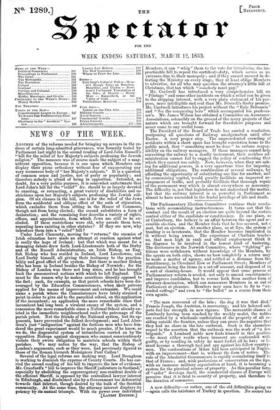TheParliamentary Election Committees continue their revela- tions with accumulating instructiveness.
It turns out that the conduct and the result of an election are quite beyond the certain. control either of the candidate or constituency. In one place, as at Canterbury, the bribery is an affair between the agent and ac- cessible electors, and the Member finds that he has secured, not a seat, but an ejection. At another place, as at Rye, the system of treating is so inveterate, that the Member becomes implicated in it without being aware. The experience of Chatham teaches us, that men high in rank and official employment think it no disgrace to be involved in the lowest kind of bartering. The disclosures in the Norwich Committee, where "fighting" pe- titions were withdrawn without knowledge of the Members, by the agents on both sides, shows us how completely a return may be made a matter of agency, and settled at a distance from the constituency, in Cleveland Row or Parliament Street; Members of Parliament being the items in a set-off account, and. disposed of in a sort of clearing-house. It would appear that some process of Parliamentary reform is needed, not only to amend constituencies and improve candidates, but to rescue both from another form of attorney-domination, which can mancenvre Members in or out of Parliament at pleasure. Members may soon have to fly to "ex- tended suffrage" and even to "the ballot" as a rescue from their own agents.


























